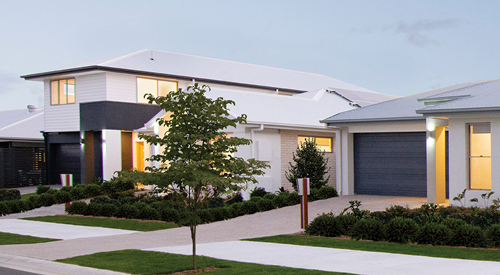Do I Need Insurance When Building a House?
January 25, 2023

Home construction is one of the leading industries in Australia, with so much land available for development and many families embarking on the exciting adventure of designing and developing their dream property.
Given the significant financial investment, however, when undertaking a new build, we must be aware of the potential risks that can arise on a construction site.
Many natural and human influences can cause damage or delays throughout the project. As such, it is often prudent (or legally required) to have adequate measures in place to safeguard against these adverse circumstances.
In this article, we explore the benefits of building and construction insurance, including the different types of policies available, the scope of coverage, and the requirements within Australia.
Do You Need Insurance When Building a Home?
If you are about to undertake a new build and in negotiations with a commercial and residential building firm, you may be asking, ‘do I really need insurance when building a house?’
The answer is yes.
Building and construction insurance arrangements provide financial protection in the event of damage to the structure of your home, or support if works aren’t completed as outlined within the contract. This can take many forms, including:
Natural & Malicious Damage
Home construction insurance can offer much-needed coverage from natural calamities or unexpected disruption from members of the public, such as:
- Fires & arson
- Rain and wind damage
- Lightning strikes
- Destruction caused by falling trees
- Theft
- Vandalism
Defects
Contractors must also have protection against defects in the building materials and supplies utilised within the project. This could be anything from non-structural cracks and spalling concrete to failing gutters and insufficient roof coverings.
Personal Injury
Even with strict adherence to health and safety standards in the construction industry, given the specialised machinery and materials utilised on a new build, there is a risk of personal injury. Your insurance policy should extend to the building site and provide coverage for injuries sustained by either members of the public, or contractors and tradespeople working on the property.
Insolvency
Given the extended construction period of most new builds and renovation projects, a company in the midst of financial difficulties may fall insolvent before the job itself is complete. Building insurance during construction will extend to cover a portion of the planned work that isn’t completed.
Construction Insurance for Homeowners
Building and construction insurance is essential for contractors and homeowners alike to protect against potential losses
Commercial Builders Insurance
Covering contractors working on incomplete construction projects when repairs or replacements are needed due to natural or malicious damage.
Public Liability Insurance
Provides coverage for a contractor should they be liable for a third-party suffering a loss or injury due to negligence or faulty products.
Contract Works Insurance
Also known as Construction Works Insurance, a Contract Works policy offers protection for projects that encounter various forms of unavoidable property damage before construction is complete. It will also include third-party legal liability, should a lawsuit be filed.
Owner Builder Insurance
A customisable form of construction insurance for homeowners undertaking the building responsibilities themselves. Whether you’re building a new home for your family or simply converting your garage, you will likely need to work closely with an insurance broker or insurance provider, explaining your project or renovation in more detail to secure the appropriate coverage.
Home Warranty Insurance
Builders and sub-contractors are often required to organise a Home Warranty insurance policy to protect homeowners against any unforeseeable events that prevent or prolong finalising the project.
Domestic Building Insurance in Victoria
In Victoria, contractors and construction companies must purchase domestic building insurance (DBI) on behalf of homeowners when undertaking residential building or renovation projects valued upwards of $16,000. This is included within their professional fees to offer coverage for construction defects or in situations where they cannot complete the work, such as if they become insolvent or pass away, alongside their existing contractual obligations and warranties.
To ensure homeowners have the appropriate coverage before work commences, builders or tradespeople must send a copy of the DBI policy and certificate of insurance for building a house before requesting the deposit be paid.
What is the Building Sum Insured?
Within your building and construction insurance policy, you can select the ‘sum insured’ for your project, which refers to the amount you can claim in a single insured event.
In Victoria, the maximum level of construction insurance cover for homeowners is capped to account for costs up to $300,000. Claims related to work that hasn’t been completed, however, may only go as high as 20% of your contract price.
When estimating the building sum insured, the figure should reflect the amount needed to replace any property that could be damaged or completely destroyed.
What if You Discover Building Defects in Your Home?
Once your new build has been completed and you perform your final walk-through, it can be hard to spot defects immediately. In fact, you might only notice structural issues or defects in your plumbing systems months or even years after moving in.
There are many ways to categorise defects. Major defects are seen as issues located in a key element of the property posing significant consequences to the greater building, while non-major defects involve damages arising from expected wear and tear. Your building contract will likely state the defects liability period, outlining a time frame within which the builders must return to remedy any noted defects.
Depending on your type of building and construction insurance, as well as the state of the defects in your property, there will be stipulations around the claims process.
For example, the $300,00 maximum sum insured for DBI can be applied to fixing structural defects within six years of project completion and non-structural defects within two years.
Making Your Home at AVID – Carolina
If you are searching for a vibrant, upcoming area to lay down your roots, be sure to review the land for sale in Carolina.
Only a half-hour drive from the Melbourne CBD, Carolina is a connected community located in Deanside. Newcomers will discover serene wetlands that are the perfect spot for families to explore, as well as a beautiful neighbouring backdrop for weekend picnics. Moreover, the future Grand Linear Park will provide thrilling walking and bike trails to enjoy all year round. Residents will also have direct access to a selection of primary, secondary and tertiary schools, the Watervale and Watergardens Shopping Centres, and much more.
For more information, visit carolinadeanside.com.au.
* DISCLAIMER: This article should not be considered professional legal, insurance or risk assessment advice. This article contains general information only and is not intended as legal, financial or insurance advice and should not be construed or relied on as such. AVID is not a legal or insurance adviser. Before making any commitment of a legal or financial nature you should seek advice from a qualified and registered legal practitioner or financial adviser or insurance broker. No material contained within this website should be construed or relied upon as providing recommendations in relation to any legal, insurance or financial product. Although every effort has been made to verify the accuracy of the information contained in this website, AVID, its officers, employees and agents disclaim all liability (except for any liability which by law cannot be excluded), for any error, inaccuracy in, or omission from the information contained on this website or any loss or damage suffered by any person directly or indirectly through relying on this information. You should seek out independent, professional advice on your personal circumstances, particular risks and financial situation before making any financial decisions.
* State of Victoria. (n.d.). Implied warranties and domestic building insurance – checklist. Consumer Affairs Victoria.
https://www.consumer.vic.gov.au/housing/building-and-renovating/checklists/implied-warranties-and-domestic-building-insurance



